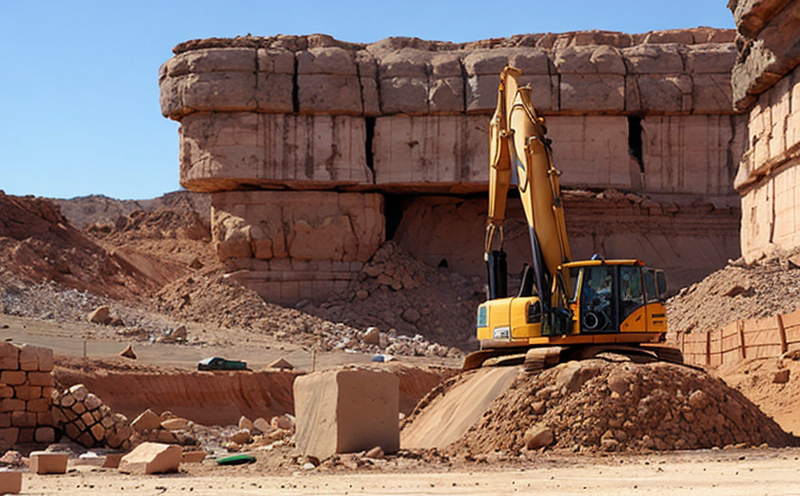BS EN 13364 Compressive Strength of Rock Cores Testing
The BS EN 13364 standard provides a method for determining the compressive strength of rock cores, which is crucial in mining testing and geotechnical engineering. This test helps ensure that the materials used in mine construction are robust enough to withstand the immense pressures found underground. Understanding the compressive strength allows engineers to design safer, more efficient mines.
Compressive strength testing plays a vital role in ensuring safety and compliance with international standards. It is particularly important for identifying rocks suitable for use as structural materials within mine infrastructure. The test involves loading rock cores until failure occurs, measuring the load at which this happens to determine the material's compressive strength.
Rock mechanics play a significant part in mining operations, and geotechnical testing ensures that these structures can withstand the dynamic forces at work underground. This includes pressure from overburden, ground water, and equipment. By accurately measuring rock cores' compressive strengths, engineers can select appropriate materials for various mine applications.
The process of determining the compressive strength involves several key steps: selecting representative rock core samples, preparing them according to specified standards, loading them into a compression testing machine, applying pressure until failure occurs, and recording the peak load. This data provides valuable insights into the material's structural integrity, helping to prevent failures that could lead to accidents or costly downtime.
Compressive strength testing is essential for quality assurance in mining operations. It ensures that materials used are suitable for their intended applications by providing a quantitative measure of how well they can withstand compression forces. This information helps maintain the integrity of mine structures, ensuring safe and efficient operations.
The BS EN 13364 method is widely recognized and accepted in the mining industry due to its reliability and accuracy. Compliance with this standard ensures that all testing practices are consistent with international best practices, enhancing confidence in the results obtained.
Understanding the compressive strength of rock cores allows engineers to make informed decisions about material selection for mine structures. This knowledge is critical for optimizing design parameters, ensuring safety standards, and reducing maintenance costs over time.
Why It Matters
The compressive strength of rock cores significantly impacts the overall safety and efficiency of mining operations. By accurately determining this value through BS EN 13364 testing, engineers can ensure that materials used in mine construction are robust enough to withstand the immense pressures found underground.
Understanding these strengths helps identify rocks suitable for use as structural materials within mine infrastructure. This knowledge is crucial for designing safe and efficient mines capable of withstanding dynamic forces such as pressure from overburden, ground water, and equipment.
The compressive strength test also plays a vital role in quality assurance by providing a quantitative measure of how well the material can withstand compression forces. This information ensures that materials used are suitable for their intended applications, maintaining the integrity of mine structures.
Applied Standards
The BS EN 13364 standard is widely recognized and accepted in the mining industry due to its reliability and accuracy. This method provides a standardized approach for determining the compressive strength of rock cores, ensuring that all testing practices are consistent with international best practices.
Compliance with this standard enhances confidence in the results obtained from compressive strength tests. It ensures that the data generated can be relied upon to make informed decisions about material selection and design parameters for mine structures. This consistency across different facilities contributes to improved safety standards and reduced maintenance costs over time.
The BS EN 13364 standard is particularly important in ensuring that materials used in mining operations are suitable for their intended applications, thereby maintaining the integrity of these structures and enhancing overall efficiency.
Benefits
- Informed Decision Making: Accurate compressive strength data helps engineers select appropriate materials for mine construction, optimizing design parameters and ensuring safety standards are met.
- Enhanced Safety: By identifying robust rock cores through this testing method, mines can minimize the risk of structural failure, thereby protecting workers from potential accidents or injuries.
- Increased Efficiency: Ensuring that materials used in mining operations are suitable for their intended applications helps maintain the integrity of mine structures, leading to more efficient and cost-effective operations.
- Consistency Across Facilities: Compliance with international standards like BS EN 13364 ensures consistency in testing practices across different facilities, enhancing confidence in the results obtained.





